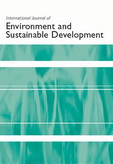
International Journal of Environment and Sustainable Development
Scope & Guideline
Exploring solutions for environmental resilience.
Introduction
Aims and Scopes
- Sustainable Energy Systems:
Research on renewable energy sources, energy efficiency, and hybrid energy systems aimed at reducing carbon footprints and promoting sustainable energy practices. - Environmental Management and Assessment:
Studies focusing on assessing environmental impacts, waste management strategies, and the implementation of green technologies in urban and rural settings. - Ecological Sustainability:
Investigations into ecological assessments, biodiversity conservation, and the sustainable management of natural resources. - Sustainable Urban Development:
Research addressing urban planning, green infrastructure, and policies aimed at enhancing sustainability in urban areas. - Social Dimensions of Sustainability:
Exploration of the social aspects of sustainability, including community engagement, corporate social responsibility, and the socio-economic impacts of environmental policies. - Climate Change Mitigation and Adaptation:
Studies on strategies for mitigating climate change impacts and adapting practices to enhance resilience in various sectors.
Trending and Emerging
- Integration of Technology in Sustainability:
There is an increasing focus on the application of advanced technologies, such as IoT and data mining, in enhancing sustainability practices and decision-making processes. - Circular Economy Models:
Research on circular economy principles is gaining traction, emphasizing sustainable resource management and waste reduction strategies. - Community-Based Environmental Initiatives:
Emerging studies focus on grassroots movements and community-driven projects that promote sustainability and social equity. - Climate Resilience Strategies:
An upsurge in research dedicated to developing strategies for climate resilience in various sectors, particularly in urban planning and agriculture. - Ecotourism and Sustainable Development:
A growing interest in ecotourism as a sustainable development strategy reflects the need for responsible tourism practices that benefit both the environment and local communities.
Declining or Waning
- Traditional Environmental Policies:
There appears to be a reduced focus on conventional environmental policies as researchers pivot towards more integrated and innovative approaches to sustainability. - Basic Waste Management Techniques:
Research on traditional waste management practices is declining as newer models such as circular economy frameworks gain prominence. - Sector-Specific Environmental Impact Studies:
Studies that focus narrowly on environmental impacts within specific sectors are becoming less common, giving way to more holistic approaches that consider cross-sectoral interactions.
Similar Journals

ENVIRONMENTAL SCIENCE AND POLLUTION RESEARCH
Connecting Science to Solutions for Pollution ChallengesEnvironmental Science and Pollution Research is a premier international journal published by Springer Heidelberg, dedicated to advancing knowledge in the field of environmental science and pollution. With an impressive impact factor reflecting its vital contributions to research, the journal is categorized in the top quartiles (Q1 and Q2) across several domains, including Health, Toxicology and Mutagenesis, and Environmental Chemistry. Established in 1994, it continues to be a critical resource for researchers, professionals, and students focusing on pressing environmental issues. The journal provides an insightful platform for disseminating significant findings related to pollution and its effects on health and the environment, contributing to a better understanding and resolution of these challenges. While it currently does not offer Open Access options, its inclusion in prominent rankings, such as the Scopus rankings, underscores its reputation and influence within the scientific community.
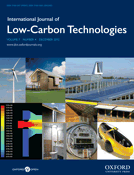
International Journal of Low-Carbon Technologies
Fueling the dialogue on resilient infrastructure and carbon reduction.International Journal of Low-Carbon Technologies is a premier, peer-reviewed publication dedicated to advancing the field of low-carbon technologies and sustainable practices. Published by OXFORD UNIVERSITY PRESS, this journal serves as a vital resource for researchers, professionals, and students alike, providing insightful research and innovative solutions for a sustainable future. With its ISSN 1748-1317 and E-ISSN 1748-1325, the journal is recognized globally, boasting an impressive impact in its categories, including a Q1 ranking in Architecture and Q2 rankings in both Civil and Structural Engineering and Environmental Science as of 2023. It is open access since 2014, facilitating the dissemination of knowledge to a wider audience, and encourages critical discourse on environmental sustainability across converging disciplines. The journal’s Scopus rankings reflecting its standing—ranked #23 in Architecture (88th percentile) and #130 in Civil and Structural Engineering—underscore its importance in driving forward the scientific agenda in low-carbon technologies. As we journey from 2007 towards 2024, the International Journal of Low-Carbon Technologies remains a cornerstone for research and dialogue in reducing carbon footprints and promoting resilient infrastructure.
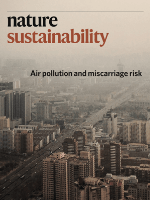
Nature Sustainability
Connecting disciplines to foster sustainable practices.Nature Sustainability, published by NATURE PORTFOLIO, is a leading international journal that champions cutting-edge research in sustainability across a multitude of disciplines. Since its inception in 2018, the journal has made significant strides in publishing high-impact articles that address the pressing challenges of our time, from ecology and food science to urban studies and renewable energy. With an impressive impact factor and consistent Q1 quartile rankings in various categories such as Global and Planetary Change and Management, Monitoring, Policy and Law, it stands at the forefront of research dissemination in sustainability. Although access options remain undefined, the journal reaches a wide audience determined to drive impactful change through innovative research within the realm of environmental and social sciences. Nature Sustainability not only illuminates pathways toward sustainable practices but also fosters interdisciplinary collaboration, making it an essential resource for researchers, professionals, and students committed to advancing sustainability initiatives globally.
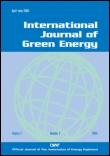
International Journal of Green Energy
Empowering knowledge for a sustainable tomorrow.The International Journal of Green Energy is a premier publication that plays a pivotal role in the field of renewable energy and sustainability. Published by Taylor & Francis Inc, this journal, with ISSN 1543-5075 and E-ISSN 1543-5083, has established itself as a crucial platform for sharing innovative research and developments from 2005 to 2024. With a commendable Q2 ranking in the category of Renewable Energy, Sustainability and the Environment, it ranks 100 out of 270 in Scopus, positioning itself in the 63rd percentile of its field. The journal is dedicated to advancing knowledge and fostering dialogue around green technologies and sustainable practices, providing invaluable insights for researchers, industry professionals, and students alike. Although it does not offer open access options, the journal's commitment to rigorous peer review ensures that only high-quality research is published, making it an essential resource for those seeking to explore and understand the complexities of green energy solutions.

Sustainable and Resilient Infrastructure
Building Tomorrow: Innovating Sustainable InfrastructureSustainable and Resilient Infrastructure, published by TAYLOR & FRANCIS LTD, is a premier journal dedicated to the advancement of knowledge in the fields of building and construction, civil and structural engineering, and geography, planning, and development. Since its inception in 2016, this journal has established itself with an impressive Q1 ranking in multiple categories, reflecting its commitment to high-quality research and innovative practices. It occupies a distinguished position in Scopus with robust rankings across various engineering and social sciences fields, making it an essential publication for researchers and professionals aiming to address contemporary challenges in infrastructure sustainability and resilience. Although it is not an open access journal, it provides a platform for critical discussions on safety, risk, reliability, and quality in engineering, further enhancing its relevance in the academic community. As it converges on its 2024 goals, Sustainable and Resilient Infrastructure continues to be a pivotal resource for those engaged in building a sustainable future.
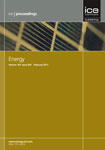
Proceedings of the Institution of Civil Engineers-Energy
Pioneering research for a resilient energy sector.Proceedings of the Institution of Civil Engineers-Energy is a pivotal journal published by Emerald Group Publishing Ltd, focusing on the dynamic fields of energy engineering and power technology. With an ISSN of 1751-4223 and an E-ISSN of 1751-4231, this journal stands at the forefront of advancing research from 2008 to 2024, encapsulating critical insights into energy systems, sustainability, and innovative practices within the energy sector. The journal holds a commendable position in Scopus rankings, especially in the categories of Energy Engineering and Power Technology, with a Q3 quartile ranking reflecting its growing influence and relevance. Though currently not Open Access, it provides valuable content for researchers and professionals seeking to explore emerging trends and challenges in energy management and renewable resources. Aimed at bridging the gap between theoretical frameworks and practical applications, this journal is essential for anyone invested in the transformation of the energy landscape.
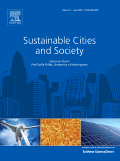
Sustainable Cities and Society
Fostering research for eco-friendly and inclusive city planning.Sustainable Cities and Society is a premier journal published by Elsevier, focusing on the interdisciplinary nexus of urban development, sustainability, and environmental challenges. With an impressive impact factor and recognized as a Q1 journal in multiple categories—including Civil and Structural Engineering, Geography, Planning and Development, Renewable Energy, Sustainability and the Environment, and Transportation—this journal stands out as a crucial platform for researchers, practitioners, and policymakers. The journal has been dedicated to advancing knowledge since its inception in 2011 and continues to be a vital resource for innovative solutions that foster sustainable urban environments. By featuring high-quality research, case studies, and reviews, it serves as an essential reference point for contemporary issues in urban planning and sustainable development. The journal's commitment to excellence is evident in its rankings, and it remains a go-to source for those invested in creating cities that are resilient, eco-friendly, and socially equitable.
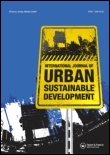
International Journal of Urban Sustainable Development
Shaping policies for a greener, smarter urban landscape.The International Journal of Urban Sustainable Development is a premier peer-reviewed journal published by Taylor & Francis Ltd, dedicated to advancing knowledge in the field of urban sustainability. With an ISSN of 1946-3138 and an E-ISSN of 1946-3146, this journal has gained recognition for its high-quality research, attaining Q1 status in multiple categories including Development, Geography, Planning and Development, and Urban Studies, per the 2023 category quartiles. Open Access since 2022, the journal ensures that groundbreaking research is widely accessible to scholars, practitioners, and policy-makers alike, enhancing its reach and impact. Operating from the United Kingdom, it focuses on a diverse array of topics related to urban environments and sustainable practices, supporting innovation and policy development. As a result, the journal holds significant placements in Scopus rankings, notably ranking #62 in Urban Studies, underscoring its pivotal role in shaping the future of sustainable urban development globally.
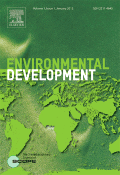
Environmental Development
Advancing sustainable solutions for a better planet.Environmental Development is a premier academic journal published by Elsevier, dedicated to advancing the field of environmental science through interdisciplinary research and innovative practices. With a focus on geography, planning, and development, as well as management, monitoring, policy, and law, this journal provides a rigorous platform for scholars and practitioners to share insights that shape sustainable environmental policy and practice. Holding a prestigious Q1 ranking in both relevant categories and boasting impressive Scopus rankings - 62 out of 821 in Geography and 60 out of 399 in Environmental Science - Environmental Development stands out as a critical resource for those invested in the future of our planet. The journal emphasizes impactful research that addresses contemporary challenges, fostering dialogue across disciplines and geographical boundaries. With a commitment to high-quality research, it offers an important outlet for those aiming to influence environmental policy and developmental strategies globally. Join the growing community of researchers, professionals, and students engaged in promoting sustainable environmental practices through the knowledge shared in this esteemed publication.

Revista Habitat Sustentable
Empowering Change through Sustainable Habitat InsightsRevista Habitat Sustentable, published by UNIV BIO-BIO in Chile, is a dynamic open access journal that has been contributing to the fields of architecture, engineering, and sustainable development since its establishment in 2011. With an ISSN of 0719-0700, this scholarly platform stands out for its commitment to disseminating high-quality research that addresses pressing issues in sustainability and urban planning. Currently, it holds commendable rankings in several categories, including Q2 in Architecture and Q3 in Urban Studies, reflecting its growing influence and outreach across various disciplines. The journal's mission is to foster interdisciplinary dialogue and encourage innovative approaches to habitat sustainability, making it an essential resource for researchers, professionals, and students engaged in addressing the complex challenges of our built environment. Accessible to a global audience, the Revista Habitat Sustentable is poised to play a pivotal role in shaping future research and policy in sustainable living and development.